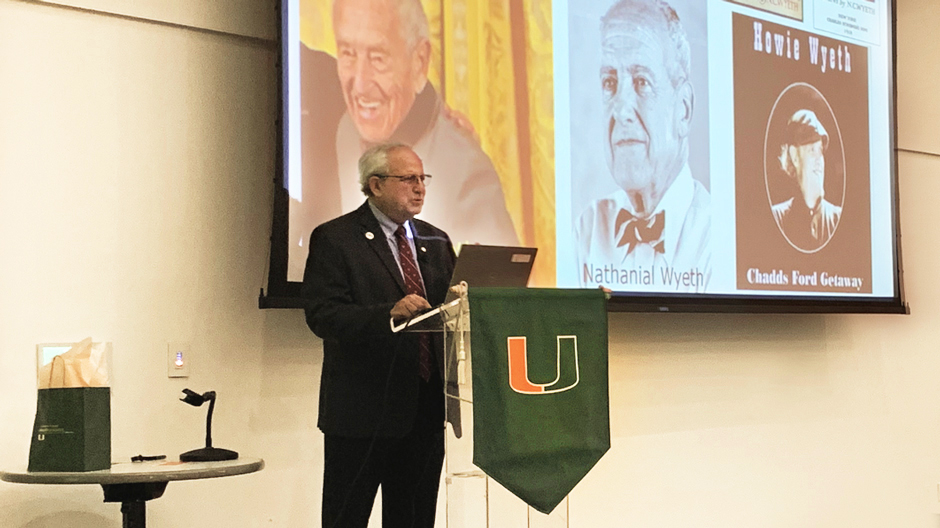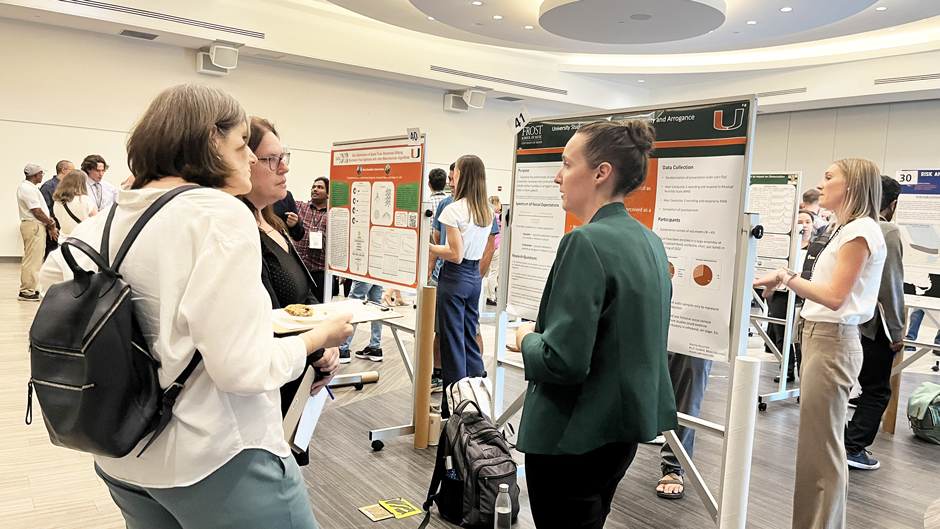A University of Miami alumnus and distinguished research professor of biomedical engineering delivered the keynote address for the Fifth Annual Graduate School and the Office of Postdoctoral Programs Research Symposium that was held in the Shalala Student Center on Tuesday afternoon.
Possessing extraordinary knowledge in engineering, chemistry, and medicine, Len Pinchuk’s speech, “The Three-Legged Stool of Innovation,” referenced the key components to innovation. He addressed students and University leaders—including Jeffrey Duerk, executive vice president for academic affairs and provost, and Guillermo “Willy” Prado, dean of the graduate school—and shared his own story, his process for obtaining more than 138 issued U.S. patents and producing more than 100 publications, and how he founded 10 companies.
“We always talk about transforming lives here at the U and when I think of Len, I can’t think of anybody, literally anybody, that I know who has transformed as many lives as he has,” said Prado as he introduced Pinchuk to attendees. “He’s an incredible researcher and scientist and we’re very lucky to call him our own.”
Pinchuk, whose most notable accomplishment includes the invention of the Nylon 12 angioplasty balloon that is used by all interventional cardiology companies, said he has been asked many times during his 30-year career how someone can be more innovative. In his speech, he referenced three principles: inventions do not happen in a vacuum, societal factors are almost always involved; perseverance is important; and lastly, creativity in any field is an inherent trait.

“With the design of a three-legged stool in mind, it is a good illustration for pursuing an innovative path as it never wobbles, an important constraint that should be considered when designing,” said Pinchuk. “There’s a saying I use that says, ‘Never give an inanimate object a choice.”
Throughout Pinchuk’s talk, he cited historical inventors like Thomas Edison, Alexander Graham Bell, the Wright Brothers, and Guglielmo Marconi as all making their inventions practical for anyone to use every day—which is what he did with the Nylon 12 angioplasty catheter.
“I took an important tool in changing cardiology from a diagnostic field to an interventional field,” said Pinchuk.
Keeping these principles in mind, Pinchuk took the audience on a journey through his career and broke down his visionary approach to inventing the stent, stent-grafts, the drug-eluting stent, novel biomaterials used all over the body, and a new stent placed in the eye to stop vision loss from glaucoma.
A world-renowned expert in the field of medical devices and biomaterials, Pinchuk’s inventions have a financial impact of more than $100 billion. In 2012, he was inducted into the U.S. National Academy of Engineering, and he received the National Academy of Engineering 2019 Fritz and Delores H. Russ Prize, the world’s top award in bioengineering, for the medical devices he invented that enable minimally invasive angioplasty treatment of advanced coronary artery disease.
Throughout his speech, Pinchuk posed questions to motivate students to think about their own quests. He shared that no matter the field, they had it in them to innovate. At the end of his address, he responded to questions from the audience and gave advice on how a post-graduate student can scale—and fund—their ideas, and he told the audience that being courageous played a role in his success.
“My father was an entrepreneur, and we discussed a lot of business at the dinner table,” said Pinchuk. “So, I always grew up having no fear of entrepreneurship, and I knew that I would own a business one day.”

